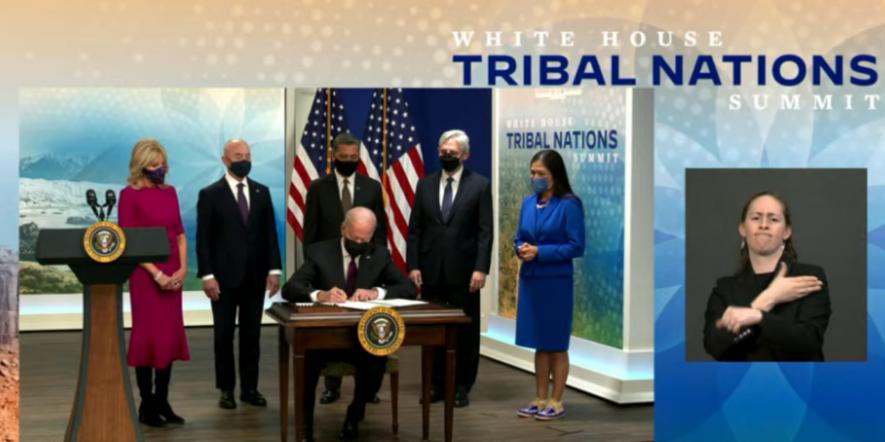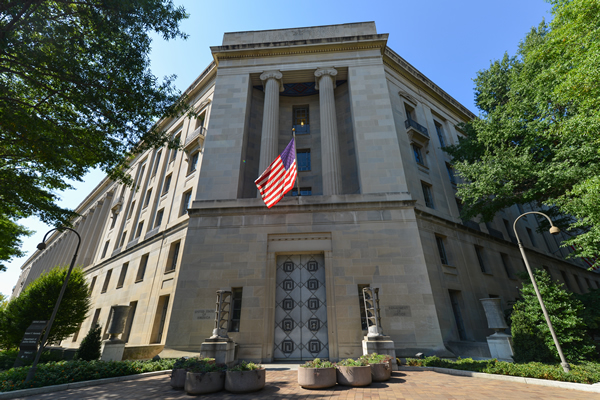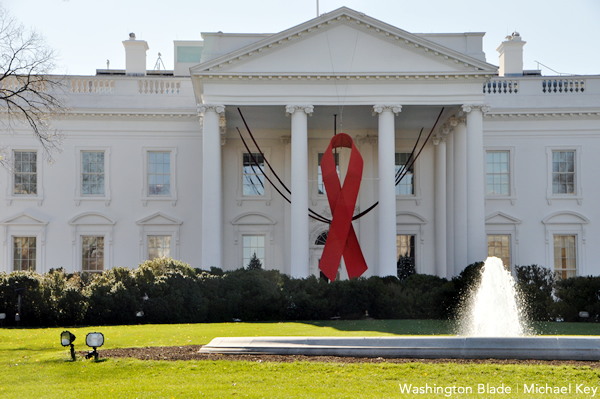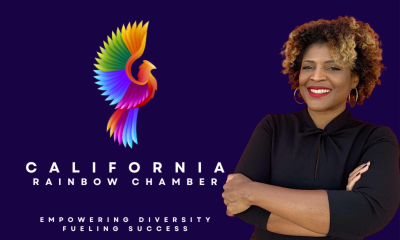White House
Biden signs order addresses safety of Native Americans, includes LGBTQ+
“We have to continue to stand up for the dignity and the sovereignty of tribal nations,” the president said

WASHINGTON – In an Executive Order signed earlier this week on Monday, President Joe Biden ordered the Federal government to work with the Tribal Nations across the U.S. to improve the public safety and criminal justice system for Native Americans.
The president signed the Executive Order as his administration kicked off the first White House Tribal Nations Summit on Monday. It was the first such gathering since the Obama White House held its last Tribal Nation Conference in September 2016.
The summit was attended by U.S. Secretary of the Interior Deb Haaland (A member of the Laguna Pueblo Nation) whose daughter is a lesbian, the President and the First Lady Dr. Jill Biden.
The summit was held virtually due to the COVID-19 pandemic. Tribal leaders representing the Tribal nations appeared on a virtual screen as a backdrop to the program at the White House, where the summit was broadcast from.
“We understand we cannot address these challenges unless we partner with and honor our nation-to-nation relationship with tribes. You all are keepers of our traditions, the defenders of our resources and visionaries for our future. You and your communities harness Indigenous knowledge that we need to help guide our government – not just across budget years, but across generations,” Secretary Halaand said as the Summit commenced.
In his remarks, Biden told tribal leaders “this is a big day” and reminded tribal leaders his American Rescue Plan included $31 billion for Tribal nations, the “most significant investment in the history of Indian country.” He also noted that the bipartisan infrastructure bill he signed later that day includes more than $13 billion in direct investments to Indian Country with intended benefits such as clean drinking water and high-speed Internet.
“We have to continue to stand up for the dignity and the sovereignty of tribal nations,” the president said.
The president outlined five new initiatives from his administration: protecting tribal treaty rights, increasing tribal participation in management of federal lands, incorporating tribal ecological knowledge into the federal government’s scientific approach, taking action to protect the greater Chaco Canyon area in New Mexico from further oil and gas leasing, and signing the new executive order addressing violence against Native Americans.
The president addressed the crisis of missing or murdered Indigenous People in the country, with a specific reference in the order to LGBTQ+ Native Americans and people who identify as “Two-Spirit” people within Tribal communities.
In the order Biden also noted that; ” Previous executive action has not achieved changes sufficient to reverse the epidemic of missing or murdered indigenous people and violence against Native Americans.”
The president’s order directs the Attorney General, the Secretary of the Interior and the Secretary of Health and Human Services to improve data collection and information sharing.
It also includes directives that the Attorney General issue recommendations to improve the use and accessibility of DNA database services, and to collect data for “ongoing analysis… on violent crime and missing persons involving Native Americans, including in urban Indian communities, to better understand the extent and causes of this crisis.”
The order also directs the Departments of Justice, the Interior, HHS, Energy, and Homeland Security to “conduct timely consultations with Tribal Nations” and to “engage Native American communities to obtain their comments and recommendations,” and provides for increased collaboration across tribal nations and U.S. government agencies, as well as for technical assistance.
Full Text:
Section 1. Policy. The safety and well-being of all Native Americans is a top priority for my Administration. My Administration will work hand in hand with Tribal Nations and Tribal partners to build safe and healthy Tribal communities and to support comprehensive law enforcement, prevention, intervention, and support services.
Generations of Native Americans have experienced violence or mourned a missing or murdered family member or loved one, and the lasting impacts of such tragedies are felt throughout the country. Native Americans face unacceptably high levels of violence, and are victims of violent crime at a rate much higher than the national average. Native American women, in particular, are disproportionately the victims of sexual and gender-based violence, including intimate partner homicide. Research shows that approximately half of Native American women have experienced sexual violence and that approximately half have experienced physical violence by an intimate partner. LGBTQ+ Native Americans and people who identify as “Two-Spirit” people within Tribal communities are also often the targets of violence. And the vast majority of Native American survivors report being victimized by a non-Native American individual.
For far too long, justice has been elusive for many Native American victims, survivors, and families. Criminal jurisdiction complexities and resource constraints have left many injustices unaddressed. Some progress has been made, particularly on Tribal lands. Given that approximately 70 percent of American Indian and Alaska Natives live in urban areas and part of this epidemic of violence is against Native American people in urban areas, we must continue that work on Tribal lands but also build on existing strategies to identify solutions directed toward the particular needs of urban Native Americans.
In 2020, bipartisan members of the 116th Congress took an important step forward through the passage of two pieces of legislation — Savanna’s Act and the Not Invisible Act of 2019 ‑- that include important provisions for improving law enforcement and justice protocols as well as improving access to data to address missing or murdered indigenous people. My Administration is committed to fully implementing these laws and working with the Congress to fund these programs for Native Americans. Earlier this year, the Secretary of the Interior and the Attorney General announced a Joint Commission, established pursuant to the Not Invisible Act, that includes: representatives of Tribal, State, and local law enforcement; Tribal judges; Native American survivors of human trafficking; health care and mental health practitioners who have experience working with Native American survivors of human trafficking and sexual assault; Urban Indian Organizations focused on violence against women and children; and family members of missing or murdered indigenous people. The Commission will work to address the persistent violence endured by Native American families and communities across the country. In addition, the Department of the Interior has established a special unit to focus resources on active and unsolved missing persons cases.
But more work is needed to address the crisis of ongoing violence against Native Americans — and of missing or murdered indigenous people. Previous executive action has not achieved changes sufficient to reverse the epidemic of missing or murdered indigenous people and violence against Native Americans. The Federal Government must prioritize addressing this issue and its underlying causes, commit the resources needed to tackle the high rates of violent crime that Native Americans experience over the long term, coordinate and provide resources to collect and analyze data, and work closely with Tribal leaders and community members, Urban Indian Organizations, and other interested parties to support prevention and intervention efforts that will make a meaningful and lasting difference on the ground.
It is the policy of my Administration to work directly with Tribal Nations to strengthen public safety and criminal justice in Indian Country and beyond, to reduce violence against Native American people, and to ensure swift and effective Federal action that responds to the problem of missing or murdered indigenous people. My Administration understands that Native American people, particularly the survivors of violence, know best what their communities need to make them safer. Consistent engagement, commitment, and collaboration will drive long-term improvement to public safety for all Native Americans.
Sec. 2. Coordination of a Federal Law Enforcement Strategy to Prevent and Respond to Violence Against Native Americans. The Attorney General, working with the Secretary of the Interior and the heads of other executive departments and agencies (agencies) as appropriate, shall assess and build on existing efforts to develop a coordinated and comprehensive Federal law enforcement strategy to prevent and respond to violence against Native Americans, including to address missing or murdered indigenous people where the Federal Government has jurisdiction. The strategy shall set out a plan to address unsolved cases involving Native Americans; provide for coordination among the Department of Justice, the Department of the Interior, and the Department of Homeland Security in their efforts to end human trafficking; seek to strengthen and expand Native American participation in the Amber Alert in Indian Country initiative; and build on and enhance national training programs for Federal agents and prosecutors, including those related to trauma-informed and victim-centered interview and investigation techniques. The strategy shall also include protocols for effective, consistent, and culturally and linguistically appropriate communication with families of victims and their advocates, including through the creation of a designated position within the Department of Justice assigned the function of serving as the outreach services liaison for criminal cases where the Federal Government has jurisdiction. The Attorney General and the Secretary of the Interior shall report to the President within 240 days of the date of this order describing the strategy developed and identifying additional resources or other support necessary to implement that strategy.
Sec. 3. Supporting Tribal and Other Non-Federal Law Enforcement Efforts to Prevent and Respond to Violence Against Native Americans.
(a) The Attorney General and the Secretary of the Interior, working with the heads of other agencies as appropriate, shall develop guidance, identify leading practices, and provide training and technical assistance, consistent with applicable law and available appropriations, to:
(i) assist Tribal governments in implementing special domestic violence criminal jurisdiction pursuant to the Violence Against Women Reauthorization Act of 2013, enabling them to prosecute certain non-Indian defendants for domestic violence and dating violence offenses in Indian Country, and also assist Tribes in implementing any relevant Tribal provisions in subsequent Violence Against Women Act reauthorization legislation;
(ii) assist Tribal governments within Oklahoma, consistent with the United States Supreme Court’s decision in McGirt v. Oklahoma, 140 S. Ct. 2452 (2020), to build capacity to handle cases within their criminal jurisdiction, including the capacity to provide victim services;
(iii) promote coordination of Federal, State, local, and Tribal law enforcement, including, as appropriate, through the development and support of Tribal Community Response Plans;
(iv) continue to assist Tribal law enforcement and judicial personnel with training, as described in 25 U.S.C. 2451, on the investigation and prosecution of offenses related to illegal narcotics and on alcohol and substance abuse prevention and treatment; and
(v) assist Tribal, State, and local law enforcement entities’ ability to apply linguistically appropriate, trauma-informed, and victim-centered practices when working with victims of crime, and to develop prevention strategies and recognize the indicators of human trafficking affecting Native Americans.
(b) The Attorney General and the Secretary of the Interior shall continue to assess their respective grantmaking operations to evaluate whether any changes, consistent with applicable law, are warranted to make that grantmaking more equitable for Tribal applicants seeking support for law enforcement purposes and for the provision of services to victims and survivors.
Sec. 4. Improving Data Collection, Analysis, and Information Sharing.
(a) The Attorney General, in coordination with the Secretary of the Interior and the Secretary of Health and Human Services (HHS), as appropriate, shall sustain efforts to improve data collection and information-sharing practices, conduct outreach and training, and promote accurate and timely access to information services regarding crimes or threats against Native Americans, including in urban areas, such as through the National Crime Information Center, the Next Generation Identification system, and the National Violent Death Reporting System, as appropriate and consistent with applicable law.
(b) The Attorney General shall take steps, consistent with applicable law, to expand the number of Tribes participating in the Tribal Access Program for National Crime Information, which provides Tribes access to national crime information systems for federally authorized purposes.
(c) The Attorney General, in coordination with the Secretary of the Interior and the Secretary of HHS, shall develop a strategy for ongoing analysis of data collected on violent crime and missing persons involving Native Americans, including in urban Indian communities, to better understand the extent and causes of this crisis. Within 240 days of the date of this order, the Attorney General, the Secretary of the Interior, and the Secretary of HHS shall report jointly to the President on the strategy they have developed to conduct and coordinate that analysis and shall identify additional resources or other support necessary to implement that strategy.
(d) The Attorney General shall assess the current use of DNA testing and DNA database services to identify missing or murdered indigenous people and any responsible parties, including the unidentified human remains, missing persons, and relatives of missing persons indices of the Combined DNA Index System and the National Missing and Unidentified Persons System. Within 240 days of the date of this order, the Attorney General shall report the outcome of this assessment to the President, along with recommendations to improve the use and accessibility of DNA database services.
(e) The Secretary of HHS shall evaluate the adequacy of research and data collection efforts at the Centers for Disease Control and Prevention and the National Institutes of Health in accurately measuring the prevalence and effects of violence against Native Americans, especially those living in urban areas, and report to the President within 180 days of the date of this order on those findings and any planned changes to improve those research and data collection efforts.
Sec. 5. Strengthening Prevention, Early Intervention, and Victim and Survivor Services.
(a) The Secretary of HHS, in consultation with the Secretary of the Interior and Tribal Nations and after conferring with other agencies, researchers, and community-based organizations supporting indigenous wellbeing, including Urban Indian Organizations, as appropriate, shall develop a comprehensive plan to support prevention efforts that reduce risk factors for victimization of Native Americans and increase protective factors, including by enhancing the delivery of services for Native American victims and survivors, as well as their families and advocates. The comprehensive plan shall, to the extent possible, build on the existing evidence base. The plan shall include strategies for improving mental and behavioral health; providing substance abuse services; providing family support, including high-quality early childhood programs for victims and survivors with young children; and preventing elder abuse, gender-based violence, and human trafficking. In addition, the plan shall also include community-based strategies that improve community cohesion and cultural connectivity and preservation, educational programs to increase empowerment and self-advocacy, and strategies to encourage culturally and linguistically appropriate, trauma-informed, and victim-centered service delivery to Native Americans, including for survivors of gender-based violence. The Secretary of HHS shall report to the President within 240 days of the date of this order describing the plan and actions taken and identifying any additional resources or other support needed.
(b) The Secretary of HHS and the Secretary of the Interior shall review procedures within their respective departments for reporting child abuse and neglect, including barriers to reporting, and shall take appropriate action to make reporting of child abuse and neglect by the Indian Health Service easier and more streamlined. In addition, the Secretaries shall assess and identify ways to expand Native American access to child advocacy center services such as pediatric medical forensic examination services, mental health care providers with advanced training in child trauma, and culturally and linguistically appropriate activities and services geared toward pediatric patients. The Secretaries shall report to the President within 180 days of the date of this order describing actions taken, findings from the assessment, and planned actions to expand access, and identifying any additional resources or other support needed.
(c) The Secretary of the Interior, consulting with the Attorney General and the Secretary of HHS, as appropriate, shall evaluate the effectiveness of existing technical assistance and judicial support services for Tribes to provide community-based conflict resolution, as well as culturally and linguistically appropriate, trauma-informed, and victim-centered strategies, including traditional healing services and healing courts, and shall identify and make improvements as needed. The Secretary of the Interior shall report to the President within 180 days of the date of this order describing the evaluation findings and the improvements implemented.
Sec. 6. Consultation and Engagement. In accordance with the Presidential Memorandum of January 26, 2021 (Tribal Consultation and Strengthening Nation-to-Nation Relationships), the Departments of Justice, the Interior, HHS, Energy, and Homeland Security shall conduct timely consultations with Tribal Nations and shall engage Native American communities to obtain their comments and recommendations regarding implementing sections 2 through 5 of this order. Tribal consultation and engagement shall continue as the strategies required by this order are implemented.
Sec. 7. Definitions. For the purposes of this order
(a) “Tribal Nation” means an American Indian or Alaska Native tribe, band, nation, pueblo, village, or community that the Secretary of the Interior acknowledges as a federally recognized tribe pursuant to the Federally Recognized Indian Tribe List Act of 1994, 25 U.S.C. 5130, 5131.
(b) “Native American” and “Native” mean members of one or more Tribal Nations.
(c) “Urban Indian Organization” means a nonprofit corporate body situated in an urban center, governed by an urban Indian controlled board of directors, and providing for the maximum participation of all interested Indian groups and individuals, which body is capable of legally cooperating with other public and private entities, pursuant to 25 U.S.C. 1603(29).
Sec. 8. General Provisions.
(a) Nothing in this order shall be construed to impair or otherwise affect:
(i) the authority granted by law to an executive department or agency, or the head thereof; or
(ii) the functions of the Director of the Office of Management and Budget relating to budgetary, administrative, or legislative proposals.
(b) This order shall be implemented consistent with applicable law and subject to the availability of appropriations.
(c) This order is not intended to, and does not, create any right or benefit, substantive or procedural, enforceable at law or in equity by any party against the United States, its departments, agencies, or entities, its officers, employees, or agents, or any other person.

U.S. Citizenship and Immigration Services on Monday announced it will ensure “male aliens seeking immigration benefits aren’t coming to the U.S. to participate in women’s sports.”
The announcement notes USCIS “has clarified eligibility for certain visa categories: O-1A aliens of extraordinary ability, E11 aliens of extraordinary ability, E21 aliens of exceptional ability, and for national interest waivers (NIWs), to guarantee an even playing field for all women’s athletics in the United States.” The new policy comes roughly six months after President Donald Trump issued an executive order that bans transgender women and girls from female sports teams in the U.S.
“Men do not belong in women’s sports. USCIS is closing the loophole for foreign male athletes whose only chance at winning elite sports is to change their gender identity and leverage their biological advantages against women,” said USCIS spokesperson Matthew Tragesser. “It’s a matter of safety, fairness, respect, and truth that only female athletes receive a visa to come to the U.S. to participate in women’s sports.”
“The Trump administration is standing up for the silent majority who’ve long been victims of leftist policies that defy common sense,” added Tragesser.
USCIS in April announced it will only recognize “two biological sexes, male and female.” Trump shortly after he took office for a second time on Jan. 20 signed the “Defending Women from Gender Ideology Extremism and Restoring Biological Truth to the Federal Government” executive order.
The 2028 Summer Olympics will take place in Los Angeles.
The U.S. Olympic and Paralympic Committee last month banned trans women from competing in women’s sporting events.
The Guardian earlier this year reported the State Department ordered consular officials “to deny visas to transgender athletes attempting to come to the U.S. for sports competitions, and to issue permanent visa bans against those who are deemed to misrepresent their birth sex on visa applications.”
Germany and Denmark are among the countries that have issued travel advisory for trans and nonbinary people who are planning to visit the U.S. The warnings specifically note the Trump-Vance administration has banned the State Department from issuing passports with “X” gender markers.
“This policy update clarifies that USCIS considers the fact that a male athlete has been competing against women as a negative factor in determining whether the alien is among the small percentage at the very top of the field,” reads the USCIS announcement. “USCIS does not consider a male athlete who has gained acclaim in men’s sports and seeks to compete in women’s sports in the United States to be seeking to continue work in his area of extraordinary ability; male athletes seeking to enter the country to compete in women’s sports do not substantially benefit the United States; and it is not in the national interest to the United States to waive the job offer and, thus, the labor certification requirement for male athletes whose proposed endeavor is to compete in women’s sports.”
The new USCIS guidance takes effect immediately.
White House
DOJ launches investigation into Calif. trans student-athlete policy
State AG vows to defend Golden State laws

One day after President Donald Trump threatened to strip California of “large scale federal funding” over its policy on transgender student-athletes, his Justice Department announced it is investigating the state for potentially violating Title IX.
“The investigation is to determine whether California, its senior legal, educational, and athletic organizations, and the school district are engaging in a pattern or practice of discrimination on the basis of sex,” the DOJ said in a statement.
The DOJ said it notified State Attorney General Rob Bonta, State Superintendent of Public Instruction Tony Thurmond, the Jurupa Unified School District, and the California Interscholastic Federation of its investigation.
AB Hernandez, 16, is an out trans female student-athlete at Jurupa Valley High School who qualified for this weekend’s state track and field championship. As the Los Angeles Blade reported earlier this week, the CIF announced a change in the rules at the finals to accommodate girls who were displaced by Hernandez, including giving medals to cisgender competitors who earn a podium spot should Hernandez place ahead of them.
“We remain committed to defending and upholding California laws and all additional laws which ensure the rights of students, including transgender students, to be free from discrimination and harassment,” said Bonta in a statement. “We will continue to closely monitor the Trump administration’s actions in this space.”
As KTLA reported, California is one of 22 states that allow trans student-athletes to participate in sports consistent with their gender identity. Former Gov. Jerry Brown signed that policy into law in 2013.
The DOJ announced it is also now supporting a federal lawsuit targeting Bonta and the state Department of Education, claiming that California law and CIF policy discriminate against cisgender girls by allowing trans female athletes to compete according to their gender identity.
The lawsuit was filed by a conservative law group, Advocates for Faith and Freedom, representing the families of two girls at Martin Luther King High School in Riverside. Their suit claims the school’s cross-country team dropped one athlete from her varsity spot in favor of a trans athlete and that school administrators compared their “Save Girls Sports” T-shirts to swastikas.
Officials in Washington also weighed-in, referring to trans girls and women as “males.”
“Title IX exists to protect women and girls in education,” said Assistant U.S. Attorney General for Civil Rights Harmeet K. Dhillon. “It is perverse to allow males to compete against girls, invade their private spaces, and take their trophies.”
“The law is clear: Discrimination on the basis of sex is illegal and immoral,” said U.S. Attorney Bill Essayli. “My office and the rest of the Department of Justice will work tirelessly to protect girls’ sports and stop anyone — public officials included — from violating women’s civil rights.”
According to Gov. Gavin Newsom’s office, out of the 5.8 million students in California’s K-12 public school system, the number of active trans student-athletes is estimated to be in the single digits.
Politics
Trump bars trans women and girls from sports
The administration reversed course on the Biden-Harris policy on Title IX

President Donald Trump on Wednesday issued another executive order taking aim at the transgender community, this time focusing on eligibility for sports participation.
In a signing ceremony for “Keeping Men Out of Women’s Sports” in the East Room of the White House, the president proclaimed “With this executive order, the war on women’s sports is over.”
Despite the insistence by Trump and Republicans that trans women and girls have a biological advantage in sports over cisgender women and girls, the research has been inconclusive, at best.
A study in the peer reviewed Sports Medicine journal found “no direct or consistent research” pointing to this conclusion. A different review in 2023 found that post-pubertal differences are “reduced, if not erased, over time by gender affirming hormone therapy.”
Other critics of efforts to exclude trans student athletes have pointed to the small number of people who are impacted. Charlie Baker, president of the National Collegiate Athletic Association, testified last year that fewer than 10 of the NCAA’s 522,000+ student athletes identify as trans.
The Trump-Vance administration has reversed course from the Biden-Harris administration’s policy on Title IX rules barring sex-based discrimination.
“If you’re going to have women’s sports, if you’re going to provide opportunities for women, then they have to be equally safe, equally fair, and equally private opportunities, and so that means that you’re going to preserve women’s sports for women,” a White House official said prior to the issuance of the order.
Former President Joe Biden’s Title IX rules, which went into effect last year, clarified that pursuant to the U.S. Supreme Court’s ruling in Bostock v. Clayton County (2020), sex-based discrimination includes that which is based on the victim’s sexual orientation or gender identity.
The White House official indicated that the administration will consider additional guidance, regulations, and interpretations of Title IX, as well as exploring options to handle noncompliance by threatening federal funding for schools and education programs.
White House Press Secretary Karoline Leavitt told reporters that Trump “does expect the Olympic Committee and the NCAA to no longer allow men to compete in women’s sports.”
One of the first legislative moves by the new Congress last month was House Republicans’ passage of the “Protection of Women and Girls in Sports Act,” which would ban trans women and girls from participating in competitive athletics.
The bill is now before the U.S. Senate, where Republicans have a three-seat majority but would need 60 votes to overcome the filibuster.
White House
Trump signs order to restrict gender-affirming health care for minors
HRC and Congressional Equality Caucus denounced the move

President Donald Trump on Tuesday signed an executive order barring gender-affirming health care for minors, the latest action by the newly seated administration that takes aim at the rights and protections of transgender Americans.
The executive order, which prohibits the federal government from engaging in activities to “fund, sponsor, promote, assist, or support” trans medicine for patients younger than 19, is based on arguments that these treatments lead to financial hardship and regret later in life.
In reality, scientific and medical organizations publish and maintain clinical practice guidelines on gender-affirming care that are based on hundreds of peer reviewed studies assessing the relative risks and benefits associated with each intervention.
“Everyone deserves the freedom to make deeply personal health care decisions for themselves and their families — no matter your income, zip code, or health coverage,” said Human Rights Campaign President Kelley Robinson. “This executive order is a brazen attempt to put politicians in between people and their doctors, preventing them from accessing evidence-based health care supported by every major medical association in the country.”
Robinson added, “It is deeply unfair to play politics with people’s lives and strip transgender young people, their families, and their providers of the freedom to make necessary health care decisions. Questions about this care should be answered by doctors — not politicians — and decisions must rest with families, doctors, and the patient.”
HRC noted that in practical terms, the federal government will effectuate this policy by taking such actions as “removing coverage for gender-affirming care from federal health insurance policies, modifying requirements under the Affordable Care Act, and preventing hospitals or other medical providers who accept Medicare or Medicaid, or who receive federal funding for research or education, from providing gender-affirming care of any kind to people under the age of 19.”
“This executive order to deny young transgender people access to the evidence-based, medically-necessary and often lifesaving care they need is an attempt by Donald Trump to insert himself into doctors’ offices across the country and override their medical judgment,” said U.S. Rep. Mark Takano (D-Calif.), chair of the Congressional Equality Caucus.
“Decisions about a young person’s healthcare belong with the patient, their families, and their doctors,” he added. “Politicians should not be overriding the private medical decisions of any person, period.”
White House
Senate confirms gay Treasury secretary nominee Scott Bessent
Hedge fund manager confirmed by 68-29 vote margin

The U.S. Senate on Monday confirmed President Donald Trump’s pick for Treasury secretary, openly gay hedge fund manager Scott Bessent.
Overcoming opposition from some economically progressive Senate Democrats like Elizabeth Warren (Mass.) and Ron Wyden (Ore.), the nominee was confirmed by vote of 68-29.
Bessent during his hearing said that extending tax cuts that were passed during Trump’s first administration with the 2017 Tax Cuts and Jobs Act but are slated to expire in 2025 will be a top priority.
“This is pass-fail, that if we do not fix these tax cuts, if we do not renew and extend, then we will be facing an economic calamity,” he told the senators.
“Today, I believe that President Trump has a generational opportunity to unleash a new economic golden age that will create more jobs, wealth and prosperity for all Americans,” Bessent said at his confirmation hearing.
According to Fortune Magazine, Bessent, who is a billionaire, disclosed assets worth an estimated $521 million.
He will be the second openly gay man to serve in the Cabinet, after Biden-Harris administration Transportation Secretary Pete Buttigieg, and in a Cabinet-level office, after Obama-Biden administration Acting U.S. Trade Representative Demetrios Marantis and Trump-Pence administration Acting Director of National Intelligence Ric Grenell.
White House
Trump immigration policies ‘will cost lives’
Groups that work with LGBTQ+ migrants, asylum seekers condemn White House EOs

Groups that work with LGBTQ+ migrants and asylum seekers have condemned the Trump-Vance administration over its immigration policies.
President Donald Trump shortly after his Jan. 20 inauguration signed several immigration-specific executive orders. They include:
• Declaring a national emergency on the Southern border
• Suspending the U.S. Refugee Admissions Program
• Ending birthright citizenship under the 14th amendment. (U.S. District Judge John Coughenour, who Ronald Reagan appointed, in a Jan. 23 ruling described the directive as “blatantly unconstitutional.”)
Trump has reinstated the Migrant Protection Protocols program, also known as the “Remain in Mexico” policy that forced asylum seekers to pursue their cases in Mexico. The White House on Jan. 20 also shut down the CBP (U.S. Customs and Border Protection) One app that asylum seekers used to schedule appointments that would allow them to enter the U.S. at ports of entry.
A press release the Department of Homeland Security issued on Jan. 21 issued notes the Trump-Vance administration has ended “the broad abuse of humanitarian parole” for undocumented migrants. Immigration and Customs Enforcement and CBP agents can also make arrests in schools, churches, and other so-called “sensitive” areas.
An ICE press release notes the agency, the U.S. Marshals Service and other federal agencies on Sunday “began conducting enhanced targeted operations” in Chicago “to enforce U.S. immigration law and preserve public safety and national security by keeping potentially dangerous criminal aliens out of our communities.”
ICE on X said its agents arrested 956 people on Sunday across the country. NBC Washington reported ICE Enforcement and Removal Operations personnel on Sunday morning were at a Fairfax County apartment building, but it is not clear whether they took anyone into custody.
A second press release that ICE issued on Jan. 23 notes the arrest of an undocumented Mexican man in Houston who was wanted for the “rape of a child” in Veracruz, Mexico. Mexican authorities took him into custody after ICE officials returned him to his country of origin.
“We now have a government that cannot manage even a simple crisis at home while, at the same time, stumbling into a continuing catalogue of catastrophic events abroad,” said Trump in his inaugural address.
“It fails to protect our magnificent, law-abiding American citizens, but provides sanctuary and protection for dangerous criminals, many from prisons and mental institutions, that have illegally entered our country from all over the world,” he added.
Immigration Equality Executive Director Aaron C. Morris on Jan. 22 said Trump’s “agenda to detain, deport, and dehumanize people is an affront to fundamental American values.”
“The executive orders will cost lives, separate families, and trap queer people in extreme danger,” he said. “They are an overt, illegal power grab with mortal consequences for LGBTQ people seeking safety in the United States.”
Then-Vice President Kamala Harris and others in the previous administration acknowledged violence based on sexual orientation and gender identity is among the “root causes” of migration from the Central American countries of Guatemala, El Salvador, and Honduras. (Morris is among the activists who sharply criticized the Biden-Harris administration over policies they said restricted LGBTQ people and people with HIV from seeking asylum in the U.S.)
“The Trump administration’s recent executive orders targeting asylum seekers, refugees, and immigrants while escalating attacks on the LGBTIQ community are unethical, un-American, and jeopardize countless lives,” Organization for Refuge, Asylum and Migration Executive Director Steve Roth told the Los Angeles Blade in a statement. “By barring asylum and suspending refugee programs, these policies strip away fundamental human rights and protections, directly threatening LGBTIQ refugees who already endure persecution, xenophobia, homophobia, transphobia, and systematic inequality.”
Familia: TQLM, an organization that advocates on behalf of transgender and gender non-conforming immigrants, was even more pointed in a statement it posted to its Facebook page shortly after Trump’s inauguration.
“On Jan. 20, we resist,” said Familia: TQLM. “This is not a day to give into fear, but a day to reclaim our power.”
“Trans and queer immigrant people have endured through regimes that sought to erase, silence, and destroy us,” it added. “Yet, we remain.”
Casa Frida, which works with LGBTQ+ migrants and asylum seekers in Mexico City, in a Jan. 20 post to its X account said it will continue to work with the aforementioned groups with the support of local officials.
“We are preparing ourselves to continue working with love and solidarity in favor of LGBTIQ communities, migrants and displaced people,” said Casa Frida. “Our programs are reorganized and coordinated with local governments with pride, dignity and without fear or shame of who we are.”
Ante los esperados cambios políticos; Estamos preparándonos para seguir adelante trabajando con amor y solidaridad en favor de las comunidades y personas LGBTIQ migrantes y desplazadas. Nuestros programas se reorganizan y coordinan con gobiernos locales. Con orgullo, dignidad y…
— Refugio LGBTIQ 🏳️🌈🏳️⚧️🇲🇽 (@CasaFridaLGBT) January 20, 2025
White House
Trump’s first week in office sees flurry of anti-LGBTQ+ executive actions
Issuance of two orders and rescission of seven specifically targeted the LGBTQ+ community

On the first day and in the first week of his second term, President Donald Trump issued two executive orders taking aim specifically at LGBTQ+ people while rescinding seven actions by the Biden-Harris administration that expanded rights and protections for the community.
As detailed by the Human Rights Campaign, the anti-trans order, titled “Defending Women From Gender Ideology Extremism and Restoring Biological Truth to the Federal Government,” would prohibit the federal government from recognizing people and populations whose birth sex does not match their gender identity, while facilitating discrimination against LGBTQ+ communities “in the workplace, education, housing, healthcare, and more.”
Additionally, the order directs the attorney general to allow “people to refuse to use a transgender or nonbinary person’s correct pronouns, and to claim a right to use single-sex bathrooms and other spaces based on sex assigned at birth at any workplace covered by the Civil Rights Act of 1964 and federally funded spaces.”
The U.S. Departments of State and Homeland Security are further instructed to stop issuing documents like passports, visas, and Global Entry cards that conflict with the new, restrictive definition of sex that excludes consideration of trans and gender diverse identities.
The order also would prohibit federal funding, including through grants and contracts, for any content that is believed to promote “gender ideology,” while implementing restrictions on the use of federal resources to collect data on matters concerning gender identity.
There would also be consequences for particularly vulnerable populations, such as rules prohibiting trans women from accessing domestic violence shelters, forcing trans women to be housed with men in prisons and detention facilities, and prohibiting correctional facilities from providing gender affirming healthcare of any kind.
The second executive order targeting LGBTQ+ people would end diversity, equity, and inclusion programs across the federal government. HRC points out that “The preamble to the order includes a mention of the Project 2025 trope ‘gender ideology,’ while the language does not actually define DEI — meaning that “confusion and differing understandings of what DEI entails are likely to extend the regulatory process and may, in the meantime, have a chilling effect on any efforts that could potentially be considered ‘DEI.'”
Of the Biden-era executive actions that were repealed, HRC called special attention to “President Biden’s directive to agencies to implement the Supreme Court ruling in Bostock v. Clayton County, which found that Title VII’s prohibition of discrimination on the basis of sex includes prohibitions of discrimination on the basis of sexual orientation and gender identity.”
The organization notes that the ruling, decided in 2020, remains binding precedent.
White House
Trump previews anti-trans executive orders in inaugural address
Unclear how or when they would be implemented

President Donald Trump, during his inaugural address on Monday, previewed some anti-trans executive orders he has pledged to sign, though it was not yet fully clear how and when they would be implemented.
“This week, I will also end the government policy of trying to socially engineer race and gender into every aspect of public and private life,” he said. “Today, it will henceforth be the official policy of the United States government, that there are only two genders, male and female.”
The president added, “I will sign an order to stop our warriors from being subjected to radical political theories and social experiments, while on duty. It’s going to end immediately.”
After taking the oath of office inside the U.S. Capitol building, Trump was expected to sign as many as 200 executive orders.
On issues of gender identity and LGBTQ rights, the 47th president was reportedly considering a range of moves, including banning trans student athletes from competing and excluding trans people from the U.S. Armed Forces.
NBC News reported on Monday, however, that senior officials with the new administration pointed to two forthcoming executive orders — the official recognition of only two genders, and “ending ‘radical and wasteful’ diversity, equity and inclusion programs inside federal agencies.”
With respect to the former, in practical terms it would mean walking back the Biden-Harris administration’s policy, beginning in 2022, of allowing U.S. citizens to select the “x” gender marker for their passports and other official documents.
“The order aims to require that the federal government use the term ‘sex’ instead of ‘gender,’ and directs the State Department and the Department of Homeland Security to ‘ensure that official government documents, including passports and visas, reflect sex accurately,'” according to NBC.
Additionally, though it was unclear what exactly this would mean, the first EO would take aim at the use of taxpayer funds for gender-transition healthcare, such as in correctional facilities.
The Human Rights Campaign in a press release Monday indicated that a “fulsome review of executive actions” is forthcoming, but the group’s President Kelley Robinson said, “Today, the Trump administration is expected to release a barrage of executive actions taking aim at the LGBTQ+ community instead of uniting our country and prioritizing the pressing issues the American people are facing.”
“But make no mistake: these actions will not take effect immediately,” she said.
“Every person deserves to be treated with dignity and respect in all areas of their lives,” Robinson said. “No one should be subjected to ongoing discrimination, harassment and humiliation where they work, go to school, or access healthcare. But today’s expected executive actions targeting the LGBTQ+ community serve no other purpose than to hurt our families and our communities.”
She continued, “Our community has fought for decades to ensure that our relationships are respected at work, that our identities are accepted at school, and that our service is honored in the military. Any attack on our rights threatens the rights of any person who doesn’t fit into the narrow view of how they should look and act. The incoming administration is trying to divide our communities in the hope that we forget what makes us strong. But we refuse to back down or be intimidated.”
“We are not going anywhere. and we will fight back against these harmful provisions with everything we’ve got,” Robinson said.
White House
GLAAD catalogues LGBTQ+-inclusive pages on White House and federal agency websites
Trump-Vance administration to take office Monday

GLAAD has identified and catalogued LGBTQ+-inclusive content or references to HIV that appear on WhiteHouse.gov and the websites for several federal government agencies, anticipating that these pages might be deleted, archived, or otherwise changed shortly after the incoming administration takes over on Monday.
The organization found a total of 54 links on WhiteHouse.gov and provided the Washington Blade with a non-exhaustive list of the “major pages” on websites for the Departments of Defense (12), Justice (three), State (12), Education (15), Health and Human Services (10), and Labor (14), along with the U.S. Equal Employment Opportunity Commission (10).
The White House web pages compiled by GLAAD range from the transcript of a seven-minute speech delivered by President Joe Biden to mark the opening of the Stonewall National Monument Visitor Center to a readout of a roundtable with leaders in the LGBTQ+ and gun violence prevention movements and the White House Office of National Drug Control Policy’s 338-page FY2024 budget summary, which contains at least a dozen references to LGBTQ+-focused health equity initiatives and programs administered by agencies like the Substance Abuse and Mental Health Services Administration.
Just days after Trump took office in his first term, news outlets reported that LGBTQ+ related content had disappeared from WhiteHouse.gov and websites for multiple federal agencies.
Chad Griffin, who was then president of the Human Rights Campaign, accused the Trump-Pence administration of “systematically scrubbing the progress made for LGBTQ+ people from official websites,” raising specific objection to the State Department’s removal of an official apology for the Lavender Scare by the outgoing secretary, John Kerry, in January 2017.
Acknowledging the harm caused by the department’s dismissal of at least 1,000 employees for suspected homosexuality during the 1950s and 60s “set the right tone for the State Department, he said, adding, “It is outrageous that the new administration would attempt to erase from the record this historic apology for witch hunts that destroyed the lives of innocent Americans.”
In response to an inquiry from NBC News into why LGBTQ+ content was removed and whether the pages would return, a spokesperson said “As per standard practice, the secretary’s remarks have been archived.” However, NBC noted that “a search of the State Department’s website reveals not much else has changed.”
White House
Biden to leave office revered as most pro-LGBTQ+ president in history
Long record of support from marriage to trans rights

President Joe Biden will leave the White House next week after leading what advocates consider to be the most pro-LGBTQ+ administration in American history.
The past four years offer a wealth of evidence to support the claim, from the passage of legislation like the landmark Respect for Marriage Act to the promotion of LGBTQ+ rights abroad as a cornerstone of U.S. foreign policy, impactful regulatory moves in areas like health equity for gay and trans communities, and the record-breaking number of gender and sexual minorities appointed to serve throughout the federal government and on the federal bench.
As demonstrated by the deeply personal reflections that he shared during an exclusive interview with the Washington Blade in September, Biden is especially proud of his legacy on LGBTQ+ rights and believes that his record reflects the bedrock principles of justice, equality, and fairness that were inculcated by his father’s example and have motivated him throughout his career in public life.
For instance, during a trip to New York in June, where he delivered remarks to commemorate the opening of the Stonewall National Monument Visitor Center, Biden explained he was deeply moved by the “physical and moral courage” of those early gay rights activists, adding that the monument honoring their sacrifices “sets an example” in the U.S. and around the world.
Likewise, Biden told the Blade he decided to publicly express his support for same-sex marriage in the midst of his reelection campaign with then-President Barack Obama in 2012 because of his experience attending an event hosted by a gay couple with their children present.
“If you saw these two kids with their fathers, you’d walk away saying, ‘wait a minute, they’re good parents,’” he said. From that moment forward, Biden was unwilling to continue to demur, even if that meant preempting Obama’s “evolution” toward embracing marriage equality.
To fully appreciate Biden’s leadership — especially during his presidency, and particularly on issues of transgender rights — it is worth considering his record against the backdrop of the broader political landscape over the past four years.
By the time he took office in 2021, conservative activists and elected leaders had positioned the trans community at the center of a moral panic, introducing hundreds of laws targeting their rights and protections and exploiting the issue as a strategy to undermine support for Democrats.
In the face of unrelenting attacks from his Republican political adversaries, Biden set to work building an administration that “looked like America” including with the appointment of trans physician and four-star officer Dr. Rachel Levine to serve as assistant health secretary, and on day one he issued an executive order repealing his predecessor’s policy that excluded trans Americans from military service.
As the 2024 election neared, with Donald Trump’s campaign weaponizing transphobia as a wedge to score votes, Biden’s support remained vocal and sustained. In each of his four State of the Union addresses to joint sessions of Congress, for example, the president reinforced his commitment to “have the trans community’s back.”
Meanwhile, midway through his term the U.S. Supreme Court overturned abortion protections that were in place since Roe v. Wade was decided in 1973, with conservative statehouses across the country taking the opportunity to pass draconian restrictions.
Democrats sought to exploit the unpopular abortion bans, especially as the presidential race was in full swing, but many were concerned that Biden might be an ineffective messenger because of his personal opposition to the practice as a devout Catholic.
While he directed his administration to take measures to protect access to abortion in the U.S. and spoke publicly about the importance of reproductive autonomy and the freedom to access necessary medical care for family planning, the Associated Press reports that as of March 2024, Biden had only used the word “abortion” in prepared remarks once in four years.
The daylight between how the president has talked about transgender rights and how he has talked about abortion offers an interesting contrast, perhaps illuminating how impervious Biden can be when pressured to compromise his values for the sake of realizing his political ambitions, while also demonstrating the sincerity of his conviction that, as he put it in 2012, anti-trans discrimination is “the civil rights issue of our time.”
Biden was scheduled to deliver a farewell address to the nation on Wednesday evening.
-

 Los Angeles5 days ago
Los Angeles5 days agoRecent L.A. County report reveals record number of hate crimes against transgender and nonbinary community members
-

 Business2 days ago
Business2 days agoLos Angeles Blade partners with the California LGBTQ Chamber of Commerce for 2026
-

 Books4 days ago
Books4 days agoThe best books to give this holiday season
-

 Celebrity News2 days ago
Celebrity News2 days agoRob Reiner, ‘The Princess Bride’ director and outspoken LGBTQ+ ally, dies at 78
-

 Music & Concerts5 days ago
Music & Concerts5 days agoSalina EsTitties and GMCLA are primed and ready for this weekend’s ‘Holiday Legends’
-

 Leather community2 days ago
Leather community2 days agoLegacy never looked so good: LA Leather Pride’s George Vasser talks titleholders past, present, and future
-

 Health4 days ago
Health4 days agoChoose U ambassadors share lived experiences with HIV, personal reflections, and insights
-

 Religion & Faith16 hours ago
Religion & Faith16 hours agoComing home to myself this Hanukkah in West Hollywood
-

 Events14 hours ago
Events14 hours agoLos Angeles Blade and matchmaker Daniel Cooley present a free gay holiday singles mixer
